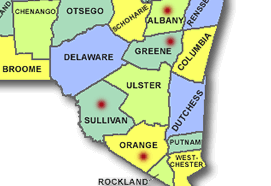In the midst of many states closing casinos and losing gaming revenue, the state of New York has a very different problem. The air is thick with “we really want the new casino here” attitude from four counties as there is an estimated $100 million in tax on the line. Orange and Greene county officials would love to grab the licensing for two new casinos, one in each county – instead of only allowing one. …Huh? Orange County officials say that if two casinos are allowed, one in Orange and one in Greene, there will not be enough cash flow for either to survive for long. Great logic!
Then Mohegan Sun executives who argue that in place of the two licenses a single casino project built in Sullivan County would benefit the region more. Better logic!

Now how did Sullivan County enter into the picture? Isn’t it always about location, location, location? Sullivan is a county to the south of Orange, much further away from Greene County to the north, but also much closer to New York City. And therein lies the reason for one very large Sullivan County casino is being proposed because logistically it’s smart. Even better logic!
Albany County, just to the north of Greene, also is in the running for the $100 million dollars in untapped gambling revenue. Recently casino executives went there to give a presentation but ending up also talking about Tyre and how much is left on the table by not pushing into the countryside. Shame on you guys.
In any case, two or one licenses will be awarded depending on the outcome over the next few weeks. On the table are, naturally, the contractor bids, the number of jobs to be added during and after the casino construction, the tourism/tax revenue it should generate.
And yet another problem is the aforementioned location, which restricts the creation of licenses to specific geographical borders, of which Greene and Albany County are both parts of. This will take amending that will cost time and tax money to complete.
If you are unfamiliar with the New York counties this map is very helpful.
Despite all the legal turmoil, this boils down to a case of how greedy local politics can be. Two casinos may very well be less than one if the return on investment for either casino falls below expectations. The possibility of either of the two falling through the cracks is not something the state gaming board wants to see to at least there is someone to talk sense into these people.
This is a good problem to have given the state of decreased gambling across the country – particularly in New Jersey. Considering casinos as a source of state revenue that it is a viable strategy if you pay attention to the public to find out where the casinos should actually be built. Philadelphia is another example where because of the high demand in the area since Atlantic City’s recent demise. It is all about supply and demand.
Constructing two casinos close by in an area of diminishing demand is less profitable than adding one to a location where the casinos overflow with players. Well, less profitable to anyone but those directly involved with its construction. It is simple math to the rest of us. But it is also an issue of why certain casino owners want to build their casinos in locations that do not present an opportunity for sustained profit and player popularity. It seems clear that just because a casino is constructed in an economically depressed area that does not translate into a long term benefit for the residents.
With the ever-increasing competition for players in most states, the idea of building a casino with it’s sole marketing to attract players from other states is going to be doomed to failure before it starts, unless a bordering state has no casinos altogether, and that is not the case. Only Utah has banned gambling of any type. (Hawaii is the second state to outlaw gambling but obviously has no neighboring states to fear.) So unless there is a drastic change, most players will opt to play in their own state for reasons of convenience. Stop and think about it – this is one of the biggest reasons for the recent fall of Atlantic City.
Maybe a series of articles on how each of the individual state’s gaming boards determines where casinos can be built is in order (spoiler alert). New York obviously has made a number of good decisions regarding its bidding process, so something can be learned from that real world example. Though this may seem odd, obtaining a license to build a new casino in the state of Nevada is very difficult. As a state who generates the majority of its revenue from the gaming industry, it has learned when there is too much of a good thing. Best logic!
Survival of state-operated casinos does not have to be assisted by injections of taxpayer money, but it is on so many levels.






